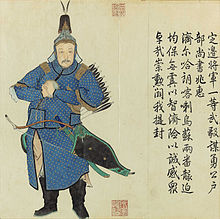
The Ten Great Campaigns (Chinese: 十全武功; pinyin: Shíquán Wǔgōng) were a series of military campaigns launched by the Qing dynasty of China in the mid–late 18th century during the reign of the Qianlong Emperor (r. 1735–1796). They included three to enlarge the area of Qing control in Inner Asia: two against the Dzungars (1755–1757) and the "pacification" of Xinjiang (1758–1759). The other seven campaigns were more in the nature of police actions on frontiers already established: two wars to suppress the Gyalrong of Jinchuan, Sichuan, another to suppress the Taiwanese aboriginals (1787–1788), and four expeditions abroad against the Burmese (1765–1769), the Vietnamese (1788–1789), and the Gurkhas on the border between Tibet and Nepal (1790–1792), with the last counting as two.